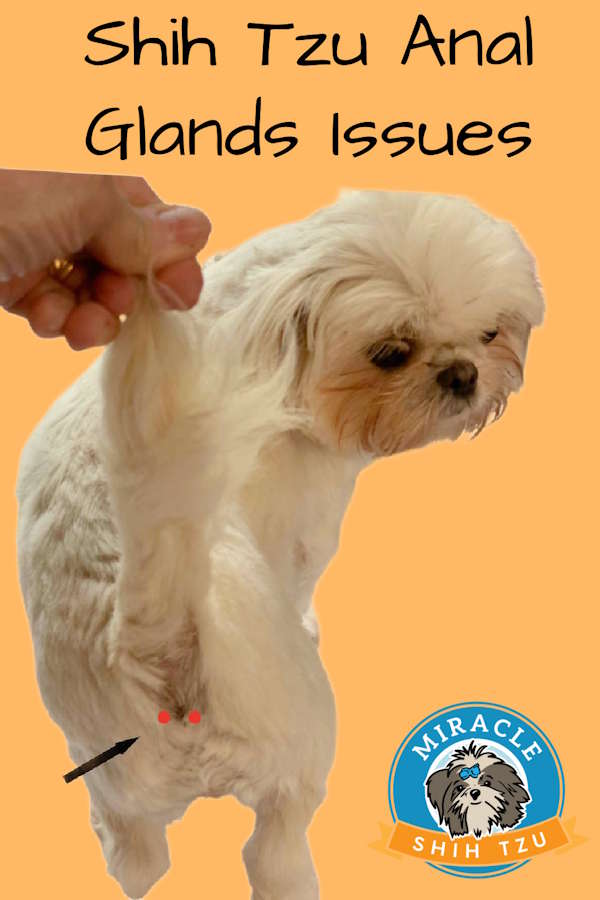Shih Tzu Anal Glands: What You Need to Know
Anal Glands by Janice Jones
Whether your Shih Tzu tends to squirt a foul fecal-smelling fluid with a fishy odor or spends his time dragging his butt over the floor, your dog may have a problem with his anal glands (or anal sacs).
A common problem with these little glands is that they cause pain and irritation, but what are these tiny glands, and what do I need to know about them?
Small breeds seem to have a higher risk for anal sac problems, and the Shih Tzu is no exception. In this complete guide, I will walk you through everything you need to know about anal gland problems in Shih Tzu dogs.

Do Shih Tzus Have Anal Gland Problems?
Have you ever seen your tiny dog trying to lick or scratch his butt? Or perhaps you've seen your cute little dog dragging his butt or scooting around the floor on her bottom? Shih Tzu dogs are considered to be small breed dogs, and as such, Shih Tzu dogs can have problems with their anal sacs. As a Shih Tzu owner, it is important to be aware of the health problems of the Shih Tzu breed.
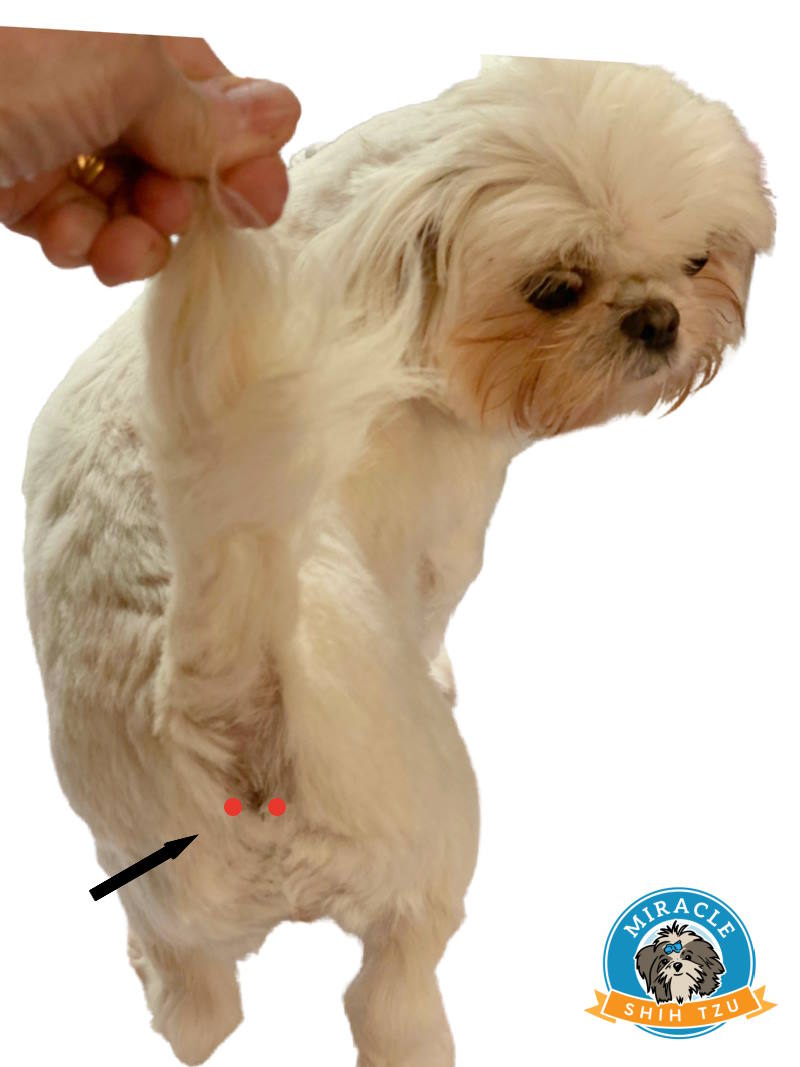 The little red dogs represent approximately where the anal glands are located internally.
The little red dogs represent approximately where the anal glands are located internally.What are Anal Glands or Anal Sacs?
These glands or sacs are located at the 4 and 8 o'clock position in the anal area, on either side of the rectum. These two tiny oval-shaped sacs on either side of the anus produce a foul-smelling fluid, often with a fishy smell but unique to each dog. The current thinking is that when dogs express this fluid, they mark their territory. It's also possible that dogs may involuntarily express their anal glands when they are stressed or fearful.
Often referred to as scent glands in animals, the purpose of these little sacs is to allow a dog to mark his territory and identify other dogs by their odor. Each dog produces an excretion with a unique scent that identifies him and tells other dogs such things as your dog's sex, health, and approximate age.
Remember that smell is the most developed sense in the canine and is a form of communication. Most mammals have these glands. Skunks, for example, use the contents of their anal glands to scare away predators.
Have you ever heard of an opossum-playing possum? This is when they lie very still, trying to appear dead. As they do this, the anal glands secrete foul-smelling liquid scaring away predators. In addition to scent glands in dogs, some experts argue that the excretion acts as a lubricant that helps a dog pass a hard stool.
When everything is fine, the glands are expressed through a duct that connects the gland to the outside of the body each time a dog has a bowel movement. When everything works the way it should, you never notice any problems. Firm, normal stools create pressure on the sacs, which in turn causes them to empty. The anal glands may not empty properly when a dog passes small, soft, loose, or soft stool.
The good news is that many Shih Tzu dogs have no issues with their anal glands. But in some dogs, these anal glands become full, impacted, infected, and can even abscess,
Where are Anal Glands Located?
If you look directly towards the dog's back end, these tiny sacs or glands are on either side of the dog's anal opening at about 4 and 8 o'clock. These glands fill up with a liquid like dark yellow, tan-colored oil.
What Happens When Things Go Wrong
When your dog's anal sacs do not work properly, problems arise. As pet parents, we can typically observe the tell-tale signs of scooting, licking, and even crying.
Symptoms of Dogs with Anal Gland Problems
There are tell-tale symptoms that owners can readily observe that may require veterinary attention.
- Dog scooting their rear end along the floor.
- Excessive licking or itching of the anal area
- Biting at his butt
- Crying or whining
- Difficulty with or straining when trying to poop.
- Blood or pus in the stool.
Common Causes of Anal Sac Problems
There can be many causes of anal gland problems; in many cases, it is due to more than one reason. The most common underlying cause of anal gland problems is poor gastrointestinal health.
Firm, normal stools create pressure on the sacs, which in turn causes them to empty. The glands may not empty properly when a dog passes small, soft, loose, or a soft stool. Allergies may also be a common cause of anal gland issues. Allergies in dogs, especially the Shih Tzu, can be tricky because they will likely manifest in different areas of your pet: skin, ears, paws, stomach, and the area around your dog's anal glands.
Another major cause of anal gland problems is your pet's anatomy. If your pet's anal glands are positioned abnormally, either too low or too far internally, they may not empty on their own.
There is also a difference of opinion regarding whether professional groomers should routinely express anal glands by hand during a typical grooming session. Traditionally, this was part of a grooming session, but not anymore. Many veterinarians suggest that groomers should not routinely express glands as this routine may cause more problems than solving any. For this reason, it's a good idea to request groomers skip this step.
Anal sac problems can occur in any dog, adult, older, middle age, and even young dogs. I have not experienced it in a new puppy, but I wouldn't rule it out. There are a few reasons why some Shih Tzu dogs develop problems with their anal sacs:
- Food allergies may result in itchy dogs. Allergies in dogs, especially the Shih Tzu, can be tricky because they will likely manifest in different areas of your pet: skin, ears, paws, stomach, and the area around your dog's anal glands.
- Obesity
- Dog food that doesn't provide enough fiber
- Chronic Soft stool
- Genetics: Small dog breeds seem to develop more issues with their anal glands than larger dogs. Shih Tzu is particularly at risk, but all dogs may have problems.
- Hypothyroidism
- Too much manipulation by the groomer when expressing anal glands is not necessary.
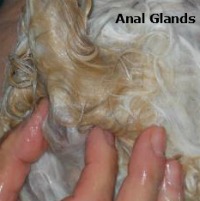 These glands are located at the 4 and 8 o'clock position on either side of the rectum. They can be expressed externally by pressing gently in the area where they are located.
These glands are located at the 4 and 8 o'clock position on either side of the rectum. They can be expressed externally by pressing gently in the area where they are located.Types of Anal Gland Problems in Dogs
Several anal gland problems include impaction, infections, abscesses, ruptures, and cancer.
Anal Gland Impactions
When the liquid generally in the sacs thickens, the pasty brown material clogs the glands and turns into thick, hard masses that will not move easily, resulting in full anal glands. Expressing the glands requires significant pressure. This causes pain in the dog.
One of the most common problems is impaction, which occurs when the sacs do not empty adequately. As the anal sac continues to fill, it will become enlarged and uncomfortable. This is where you will see dogs scooting along the floor on their hind end.
Anal Sacculitis or Infections / Abscesses
The dog will be in severe pain if there is an infection or abscess. You may hear the dog cry out. Signs of infection include pus and inflammation, and the area will be hot to touch. If an abscess occurs, you'll see discoloration, a hot, swollen area, and the gland opening obstructs. The medical term for anal gland infections is anal sacculitis. If infections are not treated, they can lead to abscess formation and even cause the anal sac to rupture. At this point your dog will be in extreme pain. You may see greenish, yellow, or bloody puss.
Anal Sac Adenocarcinoma
A severe disease of the anal sacs is a type of cancer known as anal sac adenocarcinoma.
An adenocarcinoma is the most common type of tumor to affect the anal sac. This anal gland cancer causes elevated calcium levels and signs such as excess thirst and weakness.
Managing and Treating Anal Gland Problems in Shih Tzu Dogs
If your dog is scooting, it probably means the glands or anal sacs have a problem. The good news is that many Shih Tzu dogs have no issues with their anal glands. But in some dogs, these anal glands become full, impacted, infected, and can even abscess.
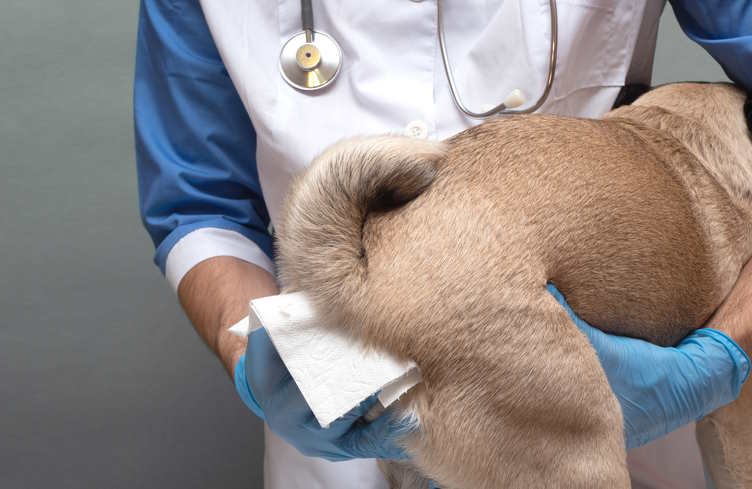 The vet is expressing the anal glands of a pug while the dog stands on a table.
The vet is expressing the anal glands of a pug while the dog stands on a table.When you see this, it is time to take your dog to the vet. Your vet will examine your dog and do a rectal exam at the Veterinary clinic. In severe cases, your vet may recommend sedation to make the procedure more comfortable for your dog.
They will express the anal glands, and a sample of the anal gland fluid may be examined under the microscope for bacteria, yeast, or blood cells. If blood or pus is also present, the sacs are infected. The vet will also determine if an infection or abscess has occurred. Once expressed, the affected area is cleaned, and the dog is given a long-acting antibiotic injection or oral antibiotics to prevent infection.
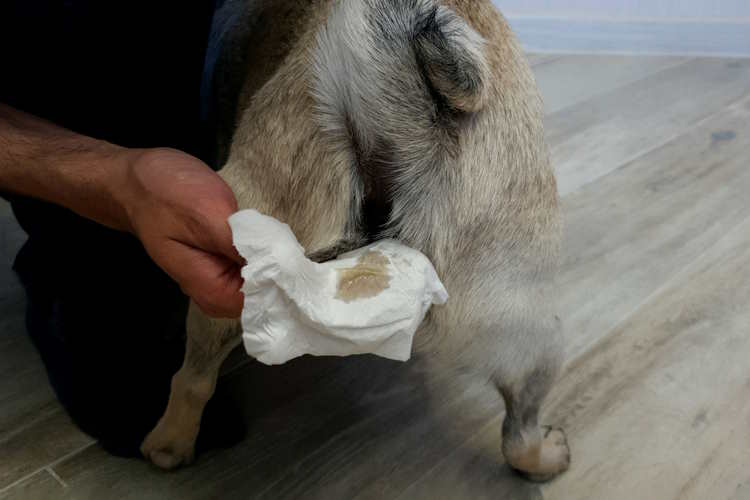 The color of the fluid that can be expressed from the anal glands can appear very dark brown to a light brown color, as shown in this photograph.
The color of the fluid that can be expressed from the anal glands can appear very dark brown to a light brown color, as shown in this photograph.If the anal sacs rupture, your vet will sedate and place a catheter into the anal gland duct. From there, the vet can inject a saline solution to open the ducts. Oral antibiotics are often prescribed, or the dog is given an antibiotic shot. The vet will recommend an e-collar to prevent the dog from biting the area if necessary. If this is beginning to sound expensive, it can be so; therefore, prevent this from happening by discovering the underlying problem with your vet's help.
In the most severe cases, your vet may recommend the removal of the anal sacs (called an anal sacculectomy). But there are risks. Risk factors include infection and even fecal incontinence.
The color of the fluid that can be expressed from the anal glands can appear very dark brown to a light brown color, as shown in this photograph.
Just a Word of Caution
Years ago, the advice given to people was to express the anal glands during each visit to the groomer. Groomers were taught to express the glands using an external method of squeezing and lifting at the 4 and 8 o'clock positions on either side of the rectum. A common misconception is that all Shih Tzu dogs need to have their anal glands expressed at every grooming appointment.
Expressing anal glands is no longer advised because experts found that dogs that were having their anal glands routinely expressed had more inflammation and problems. The actual manipulation was causing injury. However, if your vet recommends expressing your dog's anal glands at home, ask your vet to demonstrate how to do this at home.
How to Express Your Dog’s Anal Glands
If your vet recommends you express your dog's anal glands, be sure you are comfortable and confident in this procedure. If you ever notice blood or pus, consult your vet before expressing them yourself.
- Latex gloves
- Paper towels or Bath tub
- Another person to help restrain your dog, if necessary
Two Different Ways to Express Anal Glands
Anal glands can be expressed while you bathe your dog or when standing on a table. You may need another person to help hold your dog in both cases.
The best way for a person to hold a dog is to place one arm under the dog's body and the other arm around the neck. Hug the dog as close as you can to your body.
Additionally, the glands can be expressed from the outside or internally with one finger inserted in the anus.
Put on a pair of latex or similar gloves and lubricate your index finger with petroleum jelly or a water-based lubricant.
Lift your dog's tail and gently insert your index finger into the rectum approximately 1 inch.
Feel with your index finger and thumb for a firm pea-sized object at the 4 to 8 o'clock positions.
When you have found one gland, place a paper towel between the dog's anus and your hand and gently milk the gland's contents outward by applying pressure on the farthest side of the gland and squeezing toward you. Do not use more pressure than you would feel comfortable applying if you were pressing on your eyes, for example.
Empty glands are barely noticeable. If you can't feel the pea-size gland, do not try to express the gland.
Repeat on the other side for the other gland. Wipe clean.
Wet the hair around the rectum with warm water if you prefer to empty the anal glands while bathing. Repeat the process above and then rinse with warm water.
A WORD OF CAUTION: Do not put your face near your dog's rectum while doing this, as you may get squirted with the foul smelling fluid.
Advice From My Veterinarian
I had a little boy with impacted anal glands. Even though I was careful to check them each time I bathed him, the worst happened--they got infected and caused my poor dog much pain. After a round of antibiotics, my vet recommended that I add additional roughage to his diet in the form of pumpkin.
After thinking about this for a while, it made perfect sense. The high-quality dog food I was feeding was not providing the "filler" ingredients that my dogs needed. While I would never advocate putting a dog on poor or cheap dog food just because it had a large quantity of corn or other fillers, I think we need to consider that those "cheap" foods seem to improve a dog's gastrointestinal health.
What Else Can You Do To Help Your Dog: Practical Ways to Avoid Anal Gland Problems
- Feeding a high-quality diet
- Providing ample exercise.
- Preventing obesity. Overweight dogs have a high risk of having problems with the anal glands.
- Schedule regular checkups.
- Add fiber in the form of canned pumpkin (not pumpkin pie)
- Add fish oil. The Omega 3 in fish oil has anti-inflammatory properties, which can also help if your dog has recurring skin problems.
- Determine if your dog has a food allergy and work with your vet to find a different type of food.
- Avoid expressing the anal glands unless recommended by your veterinarian.
Conclusion
It is amazing how such tiny little glands can cause such misery to dogs, but when they are impacted or infected, they do just that. Shih Tzu dogs are by no means the only breeds with problems, but it is something to be aware of, especially if you see your dog scooting on the ground. Unless your veterinarian has instructed you to express the glands at home, the job is best left to your vet. Once at the vet's office, your dog may be sedated and given antibiotics, depending on the severity of the problem. The good news is that your dog will return to his happy, playful self once treated.
References
Anal Glands in Dogs: Everything You Need to Know
Shih Tzu Anal Glands: Pin for Future Reference
"Hi, I'm Janice Jones, a former veterinary technician and Shih Tzu expert with over 40 years of experience with the breed. Through Miracle Shih Tzu, I combine my medical background and extensive breed knowledge to provide reliable, practical advice for Shih Tzu owners. My mission is to help you give your Shih Tzu the happiest, healthiest life possible through evidence-based information and real-world solutions. Whether you're new to the breed or a seasoned owner, you'll find trusted guidance here for all aspects of Shih Tzu care.
I hold an undergraduate degree in Psychology with a minor in biology, Early Childhood Education, and Nursing, and a Master's in Mental Health Counseling.
